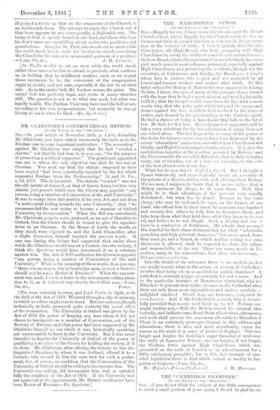THE MANCHESTER SYNOD.
[To THE EDITOR Or THE' 'SPECTATOR.")
SIS,—llappily for me, I have nutuy friends amongst the Broad- Church school, which, happily for the Church, exerts its due in- fluence and finds its proper function as a factor in the preserva- tion of the balance of faith. I find it plainly divisible, into three types ; the High-Broad, who have sympathy with High Churchmen in seeing the utility of symbols and external forms ; the Low-Broad, admh ably represented by one who lately has occu- pied much space in your columns, polemical, especially against High Churchmen, and preserving the accidents, though not the essentials, of Calviuisin ; and, thirdly, the Broad par et simple, whose love is justice, who respect and are respected by all honest and earnest workers and seekers after truth. To this latter school the Bishop of Manchester was supposed to belong. To him, I know, the eyes of many of the younger clergy turned with the hope that he had a great mission, and would admirably fulfil it; that the Gospel would come from his lips with a more manly ring, that the petty spite which inflamed the wasps and drones against the bees would be held in check by his sense of justice, and shamed by his proclamation of the Catholic spirit. He had a chance of being a hero-leader that falls to the lot of few. He had, for it is lost. -His bodyguard of supporters will be but a sorry substitute for the free admiration of many from not one school alone. The last hope of his recovery of the power or the desire for fairness seems now to have been destroyed by his recent "admonition" and action, over which Low Charchmen will blindly, and High Churchmen presciently, rejoice. It is just the multifarious injustice of the position assumed by Bishops and the Press towards the so-called Ritualists, that is daily bringing many, out of chivalry, out of a bye for fair-play, to the side of the best abused men of our day.
What has he now done ? Calle 1 a Synod. Bat I thought a Synod historically and etymologieally meant an assembly of the priests of a diocese, sitting with and advising their Bishop. We are now, I suppose, to learn that it means rather that a Bishop summons his clergy, to sit upon them. Well, that might be to their advantage, if the pressure were equally distributed; but what has he done ? Because he has some clergy, who may be reckoned, he says, on the fingers of one band, who offend him by their ritual, he summons four hundred and seventy-five others to help him to denounce them, and take from them what they bold dear, what they know to be use- ful, and believe to be not illegal. Such a display and use of force is a confession of feebleness. He admits that amongst this handful he finds those distinguished for their " admirable preaching and high personal character ;" but never mind, down they must go, and a Synod, in which neither voting um- even discussion is allowed, shall be expected to share the odium and responsibility of his act. There are many words in his preface, many in his admonition ; four alone are necessary,— Stet pro rations volantas.
Into the details of the utterance there is no need to go, but one might inquire what in the nature or history of Cathedrals justifies their being set up as an ideal for parish churches ? A cathedral is certainly a type ; as certainly it is not a norm. And in the particular instance of Manchester Cathedral, why are Ritualists to put out their lights, because in the Cathedral altar there are only those most superstitious and useless symbols,— unlighted candles ? Dumb dogs are treasures, compared to acca lamina. And if the Cathedral be a norm, why is it care- fully provided that no one need level up to it ? Perhaps one might further ask,—Will the Bishop extend his original idea logically, and indicate some Rural Dean whose views, utterances, and work shall present the maximum allowable to Ritualists?
There is an extremely grotesque element in this address and admonition ; there is also, and more abundantly, cause for sorrow at the want of a sense of justice it displays. One can forget and forgive his lordship's eager throwing of mud over the walls of Lancaster Prison ; one can forgive, if not forget, the libellous letter against High Churchmen which was
placarded on the walls of London as an advertisement for a filthy catchpenny pamphlet ; but in this last example of one- sided legislation there is that which cannot so readily be for- gotten or forgiven.—I am, Sir, &c., lTrr 3fajesty'8 Prison) Clerkenwell. J. W. HORSLEY.






































 Previous page
Previous page